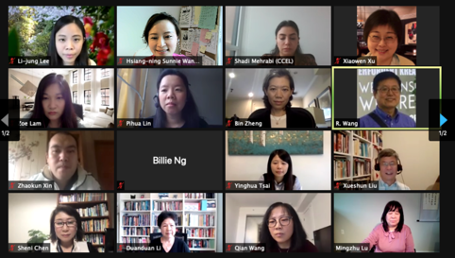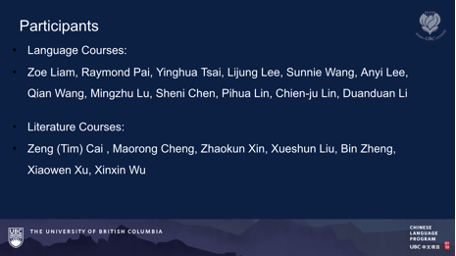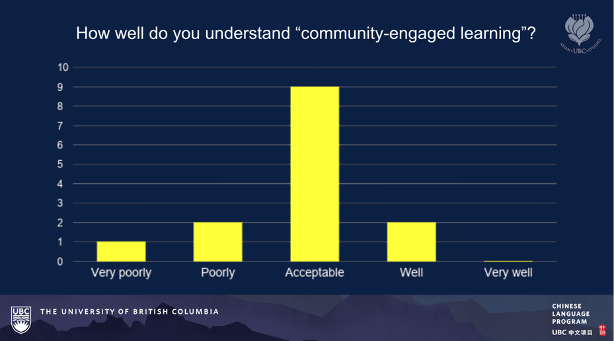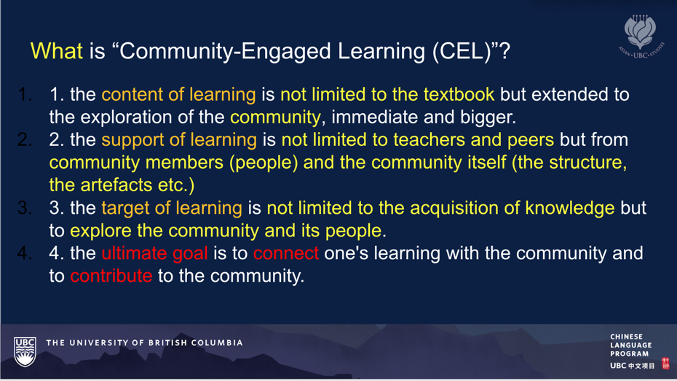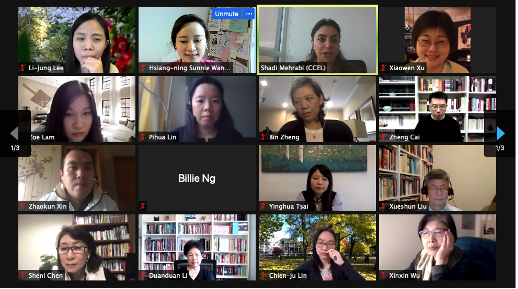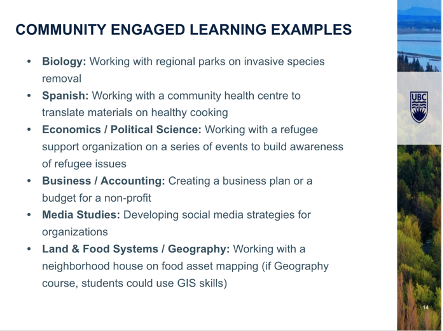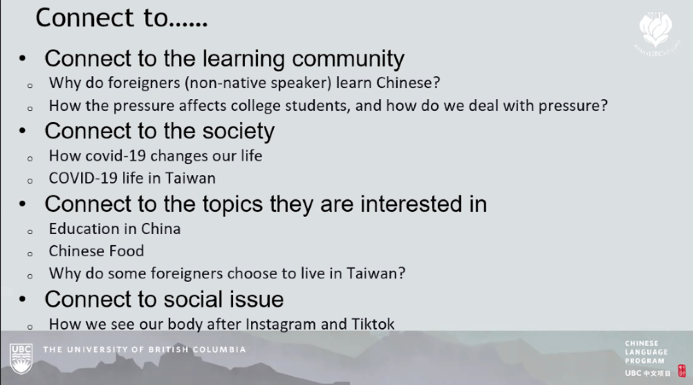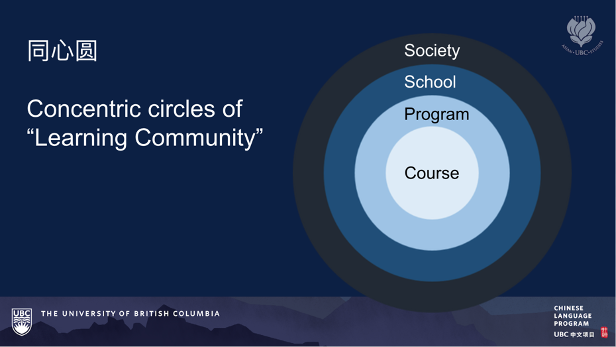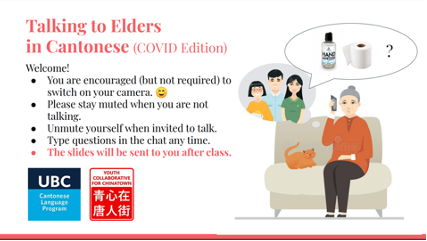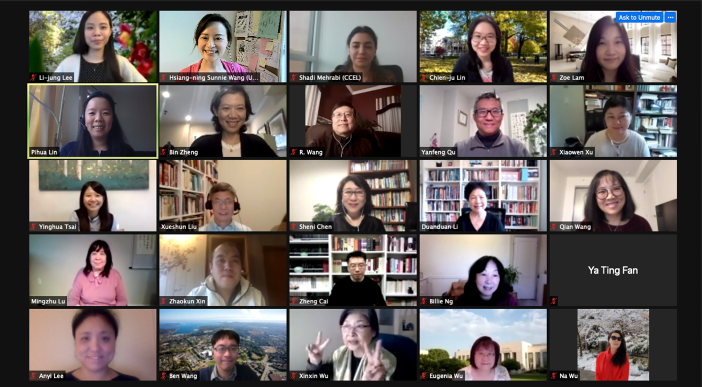The Virtual Community-Engaged Teaching and Learning Workshop brought instructors from the Chinese and Cantonese Language Programs together along with special guests from both programs, the Centre for Community-Engaged Learning, and various individuals from well-known Canadian universities. In an engaging day of discussions, they sought to broaden the horizons of the Chinese Language Program and expand their community by interacting with individuals and groups outside the program. The focus of the workshop was to develop community-engaged teaching and learning strategies in order to offer students the very best!
“I think community engagement learning is very important, for both face-to-face courses at normal times and especially for online courses, as it creates a positive and supportive environments for all students so that they can have a sense of community and FEEL COMFORTABLE AND CONFIDENT TO SHARE their learning experience, tips, and even stressful emotions, which could be very helpful to peer learning, stress relieving, etc,” one participant noted in the pre-workshop survey.
What Is Community-Engaged Teaching and Learning?: To New Horizons!
A pre-workshop survey demonstrated that the participants had a wide range of ideas of what community-engaged teaching and learning is. They understood the general concept and agreed that it was “the essence of learning” where all parties involved “feel included and encouraged and feel comfortable.” Participants also agreed that it was “important” and something they would like to “learn more about”. The workshop offered them the opportunity to learn from and teach each other, developing new strategies to adopt into their pedagogies. It really goes to show that you can be a life-long learner!
“Community Engaged Learning is to integrate community with activities designed to develop intercultural competence, critical thinking and reflection, and civic engagement. It usually brings course content to life by providing students opportunities to apply their course-based knowledge within real-world settings.”
The Chinese Language Program seized this opportunity to make sure all instructors knew exactly how to incorporate community-engaged learning and teaching by reaching out within their own communities. One of instructors in the Chinese Language Program pointed out the importance of this pedagogy as the “target of learning is not limited to the acquisition of knowledge but to explore the community and its people.”
“Under the current Covid-19 situation, it is especially important to foster a sense of community among students within a class, on the one hand. On the other hand, making the students realize the presence of a larger community both within and beyond the virtual classroom helps ease their anxiety over the isolation they have been undergoing currently.”
Specialists from the Centre of Community-Engaged Learning provided further clarification about the meaning behind community-engaged teaching. By their definition, community-engaged learning “encompasses various learning opportunities that involve students applying their academic learning within or in close collaboration with a community context, emphasizing mutual benefit, civic engagement and all parties sharing in the teaching and learning process”. They also showed every participant how to adopt it into virtual learning by demonstrating how courses from other faculties have adopted community-engaged learning and teaching. Most interestingly, the specialists presented their knowledge in a way that engaged with every participant, just as lecturers and professors would teach in their own classes!
“This workshop gave me much inspiration on other possibilities of engaging online communities beyond inviting guest speakers. Especially during the pandemic, the virtual contexts in fact may have made it easier for people from different communities to connect with each other online (literally at the tip of their finger) or by phone. The workshop reminded me that physically reaching out might have become more difficult, but virtually doing so turned out to be a promising alternative.”
Several members from the Chinese Language Program, such as lecturer Li-jung Lee, lecturer Anyi Lee, lecturer Sheni Chen, lecturer Xueshun Liu, and last but not least, lecturer Bin Zheng all presented in the workshop as well. They explained what community-engaged teaching by demonstrating how they have adopted it into their courses.
Lecturer Bin Zheng had an immensely interesting and successful take on online-learning as up to 75% of her course was taught asynchronously. Yes, 75%! Yet, despite the fact that students didn’t have many opportunities to meet face-to-face, lecturer Zheng was still able to astoundingly create a warm sense of community. How? You may ask. She let students use various course activities to create a classroom community! She taught and allowed students to share tips about how to succeed in online school. Her way of teaching motivated everyone to stay happy and healthy, and encouraged students to excel in his course. By interacting with each other, it was as if students were still back at school. Isn’t it amazing how students and lecturers alike can overcome the obstacles of online-learning and still create a sense of community?
Lecturer Anyi Lee did something similar, also using her course as a means to create a sense of community. She, however, used their final project to show what a community is and how it is different in different areas, such as China, and online communities. She also also gave students creative liberties to construct their final project, as they were encouraged to pick a topic that they were interested in. In doing so, lecturer Lee opened a gateway for students to not only learn more about various communities, both local and international, she also gave them a once-in-a-lifetime opportunity to connect to said community emotionally, intellectually, and so on—all forms of connection that they may not experience elsewhere.
Need a hand? Let’s Expand Our Community and Grow Together!
“[The workshop] is designed well and conducted effectively. First, experts introduced community-engaged teaching and learning. Then, instructors shared their practices. It showed how to adopt this pedagogy in teaching.”
Guest speakers beyond the Chinese Language Program were also invited to share their experience with community-engaged learning and how it has transformed their pedagogies for the better. From the Cantonese Language Program, the director of the Cantonese Language Program, Raymond Pai himself attended the workshop, as well as lecturer Zoe Lam.
Zoe Lam presented how she taught students ways to engage their communities by talking to their elders in Cantonese. As well, she worked with the pandemic by incorporating vocabulary and phrases related to COVID-19. That way, lecturer Lam gave her students a unique opportunity to not only learn a new language, but also connect to their loved ones or people from their community, and check how they are coping with the pandemic. Zoe Lam also partnered with a local, grassroots organization, Youth Collaborative for Chinatown, who works to create an intergenerational, Chinese community in Chinatown. By doing so, students, whether local, domestic, or international, can learn more about Vancouver and how to connect with the Chinese culture or their own heritage. As well, director Raymond Pai provided constructive yet creative suggestions for the Chinese Language Program, offering unique ideas that could improve the program and help incorporate more community-engaged teaching and learning into courses.
More astoundingly, the Chinese Language Program extended our community beyond UBC! All participants demonstrated that a community is not just where a group of likeminded people are situated. Instead, communities transcend geographic locations. UBC’s Chinese Language Program invited directors, professors, and lecturers from the Chinese language programs of several renown Canadian universities, such as McGill University, the University of Toronto, Simon Fraser University, and the University of Victoria, to attend this workshop! Up to thirty non-UBC participants attended, including Professor Jun Tian, the Chinese Language Coordinator of the University of Victoria. Another participant was Professor Billie Ng from Simon Fraser University, who is currently doing research for SFU’s Mandarin class to create a more “blended” learning environment through various styles of teaching.
“The workshop introduced many useful teaching strategies and potential resources for enhancing community engagement in the virtual contexts. The sharing presentations were particularly eye-opening. The introductory presentations at the beginning mentioned many useful resources and grant opportunities.”
Thanks to every participant, especially those who came from outside of UBC’s Chinese Language Program, our sense of community has never felt so strong! It is so heart-warming and accomplishing to achieve such an environment when everything is done exclusively online.
Let’s Move Towards the Future: Here’s To Brighter and Better Days!
All in all, the Virtual Community-Engaged Teaching and Learning Workshop was a huge success and it was all thanks to the participants’ openness to learn. In a post-workshop survey, everyone noted that the workshop was not only “extremely effective”, but also “extremely helpful” as it taught them exactly what community-engaged learning and teaching was. As well, they learned how to “incorporate community-engaged teaching into [their] own teaching design” through examples that the special guests provided. Importantly, the event demonstrated that learning stems from the community itself—only by teaching and learning from each other can we effectively learn.
